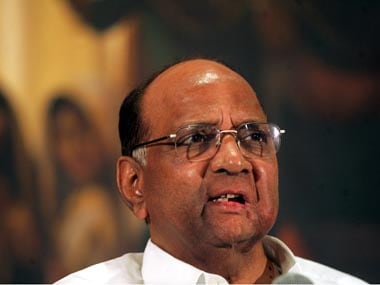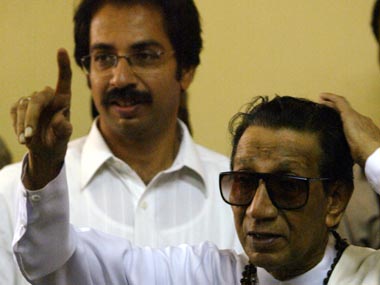Last weekend, Maratha strongman and Union Agriculture Minister Sharad Pawar said something, which, had it been serious, would have had tremendous impact on Maharashtra’s power establishment. Henceforth, he said, political dynasties would not be promoted. There would be no ticket from his party to the kith and kin of people who were already in politics and held seats in various elected bodies. That was big. But he seems to have made the announcement – ignored by most of the media, except Loksatta, a leading Marathi daily from The Indian Express stable – more in the context of the civic elections in several major cities, Mumbai included. The intent appears to be to ward off claims from sitting corporators that their wives, daughters, sisters, or mothers be given tickets because their wards were now reserved for women. Every other seat is now reserved for women under the law. The cruel thing about this potentially significant political step is that it does not lie in Pawar’s mouth to even say it without apologising for presiding over what actually is Maharashtra’s first political family. [caption id=“attachment_181369” align=“alignleft” width=“380” caption=“Pawar has both his nephew, Ajit Pawar, and daughter Supriya Sule in politics. Reuters”]
 [/caption] Pawar has both his nephew and daughter in politics. Nephew Ajit Pawar has been an MLA or MP all his political life. He was a long-time minister and is now the Deputy Chief Minister of Maharashtra. His daughter Supriya Sule was accommodated from his fail-safe Baramati constituency to enable her to enter the Lok Sabha; the father shifted to Madha seat in 2009. In the past, he and Ajit had swapped Lok Sabha and assembly seats for reasons of political convenience. To be fair to Sharad Pawar, his is not the only leader heading a political clan in Maharashtra. A brick, it is said, cannot be hurled in any direction without it landing on a political clansman. Each district, and sometimes even parts of one, has a strong political family outside of which power, even if acquired through the process of election, has hardly moved. These families are like satraps, of course with some minor phases when the power ebbed somewhat. The list below is only illustrative, and not exhaustive. Chhagan Bhujbal, a minister himself, has his nephew, Sameer, in the Lok Sabha; his son Pankaj is in the Maharashtra assembly. Union Power Minister Sushilkumar Shinde’s daughter and Union Science & Technology Minister Vilasrao Deshmukh’s son are in the legislature. When Shankarrao Chavan was chief minister of Maharashtra and later held key ministerial positions at the Centre, son Ashok was a Maharashtra legislator. Like the Pawars, they too had once interchanged their posts. Ashok Chavan was CM till the Adarsh Society scam ended his reign a little over a year ago. Current CM Prithviraj Chavan’s mother served in the Rajya Sabha after his father, who was an MP, passed away. In Jalna in Marathwada, the Tope family rules the roost. Four males controlled, at one time, all the democratically-elected bodies, from a seat in Parliament to the chairmanship of the local municipality, with cooperative bodies – from milk to credit societies, often a sugar factory thrown in – being their fief. Power at every level made ruling the fiefdom easier. Being elected made it democratic, though in essence it is a mix of nepotism giving rise to strong monocracies. That is how political clans emerge and are sustained. In Akluj in Solapur district, not a single post, elected or appointed, can go to anyone but a Mohite-Patil or his nominee. Vijaysinh Mohite-Patil, his son and brother control everything, even if it required the brothers to divide their loyalties between two parties. Gopinath Munde’s daughter and nephew are also in politics. Continues on the next page The Shiv Sena too has this trend, with the leadership of the party vested in the Thackerays. Between them the father (Balasaheb), son (Uddhav) and grandson (Aditya) call the shots, together and severally. After all, a clan is everything. Why should people in a democracy, where everything revolves around your entitlement to choose, allow dynasts to be foisted on them? Logically, on the analogy of the son of a shopkeeper taking over his father’s business, holds. Politicians give the excuse that their kith and kin have won an election on their own strength. They cannot be debarred from standing for elections just because of their parentage. Their victory, however, is dependent on being a scion, backed by the parent’s strong networking, even wealth. Scattered across Maharashtra, these clans have reached a size and spread that could well be a throwback to the Adil Shahi days when as many as 96 families were said to have taken hold of subordinate power. They decided how the wind blew locally; in today’s arrangement, most districts are a single family’s bailiwick. They all happened to be Marathas then. [caption id=“attachment_181377” align=“alignright” width=“380” caption=“The Shiv Sena too has this dynastic trend, with the leadership of the party vested between Balasaheb, son Uddhav and grandson Aditya. Reuters”]
[/caption] Pawar has both his nephew and daughter in politics. Nephew Ajit Pawar has been an MLA or MP all his political life. He was a long-time minister and is now the Deputy Chief Minister of Maharashtra. His daughter Supriya Sule was accommodated from his fail-safe Baramati constituency to enable her to enter the Lok Sabha; the father shifted to Madha seat in 2009. In the past, he and Ajit had swapped Lok Sabha and assembly seats for reasons of political convenience. To be fair to Sharad Pawar, his is not the only leader heading a political clan in Maharashtra. A brick, it is said, cannot be hurled in any direction without it landing on a political clansman. Each district, and sometimes even parts of one, has a strong political family outside of which power, even if acquired through the process of election, has hardly moved. These families are like satraps, of course with some minor phases when the power ebbed somewhat. The list below is only illustrative, and not exhaustive. Chhagan Bhujbal, a minister himself, has his nephew, Sameer, in the Lok Sabha; his son Pankaj is in the Maharashtra assembly. Union Power Minister Sushilkumar Shinde’s daughter and Union Science & Technology Minister Vilasrao Deshmukh’s son are in the legislature. When Shankarrao Chavan was chief minister of Maharashtra and later held key ministerial positions at the Centre, son Ashok was a Maharashtra legislator. Like the Pawars, they too had once interchanged their posts. Ashok Chavan was CM till the Adarsh Society scam ended his reign a little over a year ago. Current CM Prithviraj Chavan’s mother served in the Rajya Sabha after his father, who was an MP, passed away. In Jalna in Marathwada, the Tope family rules the roost. Four males controlled, at one time, all the democratically-elected bodies, from a seat in Parliament to the chairmanship of the local municipality, with cooperative bodies – from milk to credit societies, often a sugar factory thrown in – being their fief. Power at every level made ruling the fiefdom easier. Being elected made it democratic, though in essence it is a mix of nepotism giving rise to strong monocracies. That is how political clans emerge and are sustained. In Akluj in Solapur district, not a single post, elected or appointed, can go to anyone but a Mohite-Patil or his nominee. Vijaysinh Mohite-Patil, his son and brother control everything, even if it required the brothers to divide their loyalties between two parties. Gopinath Munde’s daughter and nephew are also in politics. Continues on the next page The Shiv Sena too has this trend, with the leadership of the party vested in the Thackerays. Between them the father (Balasaheb), son (Uddhav) and grandson (Aditya) call the shots, together and severally. After all, a clan is everything. Why should people in a democracy, where everything revolves around your entitlement to choose, allow dynasts to be foisted on them? Logically, on the analogy of the son of a shopkeeper taking over his father’s business, holds. Politicians give the excuse that their kith and kin have won an election on their own strength. They cannot be debarred from standing for elections just because of their parentage. Their victory, however, is dependent on being a scion, backed by the parent’s strong networking, even wealth. Scattered across Maharashtra, these clans have reached a size and spread that could well be a throwback to the Adil Shahi days when as many as 96 families were said to have taken hold of subordinate power. They decided how the wind blew locally; in today’s arrangement, most districts are a single family’s bailiwick. They all happened to be Marathas then. [caption id=“attachment_181377” align=“alignright” width=“380” caption=“The Shiv Sena too has this dynastic trend, with the leadership of the party vested between Balasaheb, son Uddhav and grandson Aditya. Reuters”]
 [/caption] In a democratised Maharashtra, the ruling clans now come from other castes, too, but they are still mostly Marathas. Political expediency has allowed caste and class lines to blur. There was a time when 96 clans had a say in the geography which more or less fits today’s Maharashtra. These clans, which did not marry outside, had a say because they provided warriors to the rival rulers, and generally were a distinct social class. Even today, matrimonial advertisements speak of candidates seeking a spouse belonging to the shyanau kul — the 96 clans. This perpetuation of clans, not accidentally or incidentally, but consciously, is a dangerous trend in modern Maharashtra, even if we accept that the younger crop of politicians that has risen to elected positions is better educated. That does not deprive one of the argument that in a democracy we need a level playing field. The system of dynasties and dynasts that are there to protect clan rights eliminates that level playing field. There may not be 96 clans now; there could be less or more. But it decidedly is a throwback to those days. They have a stranglehold on virtually everything in an arrangement where laws do not matter but political power does.
[/caption] In a democratised Maharashtra, the ruling clans now come from other castes, too, but they are still mostly Marathas. Political expediency has allowed caste and class lines to blur. There was a time when 96 clans had a say in the geography which more or less fits today’s Maharashtra. These clans, which did not marry outside, had a say because they provided warriors to the rival rulers, and generally were a distinct social class. Even today, matrimonial advertisements speak of candidates seeking a spouse belonging to the shyanau kul — the 96 clans. This perpetuation of clans, not accidentally or incidentally, but consciously, is a dangerous trend in modern Maharashtra, even if we accept that the younger crop of politicians that has risen to elected positions is better educated. That does not deprive one of the argument that in a democracy we need a level playing field. The system of dynasties and dynasts that are there to protect clan rights eliminates that level playing field. There may not be 96 clans now; there could be less or more. But it decidedly is a throwback to those days. They have a stranglehold on virtually everything in an arrangement where laws do not matter but political power does.
Mahesh Vijapurkar likes to take a worm’s eye-view of issues – that is, from the common man’s perspective. He was a journalist with The Indian Express and then The Hindu and now potters around with human development and urban issues.
)